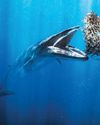
Scientists from Colegio de la Frontera Sur, in Mexico, have discovered the second-largest "blue hole" in the ocean. Blue holes are a bit like sinkholes on land. They are made in limestone rocks, which easily dissolve in freshwater. When water enters cracks in the limestone, the gaps get bigger until they eventually form an open passage. Over thousands of years, the water slowly wears away the rock, leaving vast chasms and caves. At the end of the last ice age (around 11,500 years ago), ice covering the land melted, making sea levels rise. Seawater then filled the caves, leaving deep blue holes in the middle of the ocean.
Denne historien er fra Issue 62-utgaven av The Week Junior Science+Nature UK.
Start din 7-dagers gratis prøveperiode på Magzter GOLD for å få tilgang til tusenvis av utvalgte premiumhistorier og 9000+ magasiner og aviser.
Allerede abonnent ? Logg på
Denne historien er fra Issue 62-utgaven av The Week Junior Science+Nature UK.
Start din 7-dagers gratis prøveperiode på Magzter GOLD for å få tilgang til tusenvis av utvalgte premiumhistorier og 9000+ magasiner og aviser.
Allerede abonnent? Logg på

Camera Obscura
Imagine stepping inside a dark room, where the only source of light comes through one small hole in the wall.

MANCHESTER SCIENCE FESTIVAL
From 18-27 October, shoppers at the Arndale shopping centre in Manchester, England, will face a giant spider.

Should musicians stop touring?
Multiple concerts travelling around the world have a big impact on the environment.

Are ghosts real?
Plenty of people believe in ghosts, but it's hard to find proof.

SMASH STEREOTYPES
In an extract from his prize-winning book, scientist and writer Adam Rutherford shows you how to use the power of science to fight racism. This chapter, titled Myth-Busting, is all about sport.

Animal awareness
What would it feel like to be another animal?

Hamza Yassin
Go behind the camera with a wildlife filmmaker.

WILDLIFE WATCH
Ben Hoare goes on a safari from his sofa to discover how nature documentaries are made.

Big bum breakthrough
A team of researchers who found out that mammals can breathe through their bottoms have won a prize at the lg Nobel awards.

A jaw-dropping undersea snap
A photograph of a Bryde's whale feeding on a heart-shaped \"bait ball\" of sardines has won the Ocean Photographer of the Year contest.